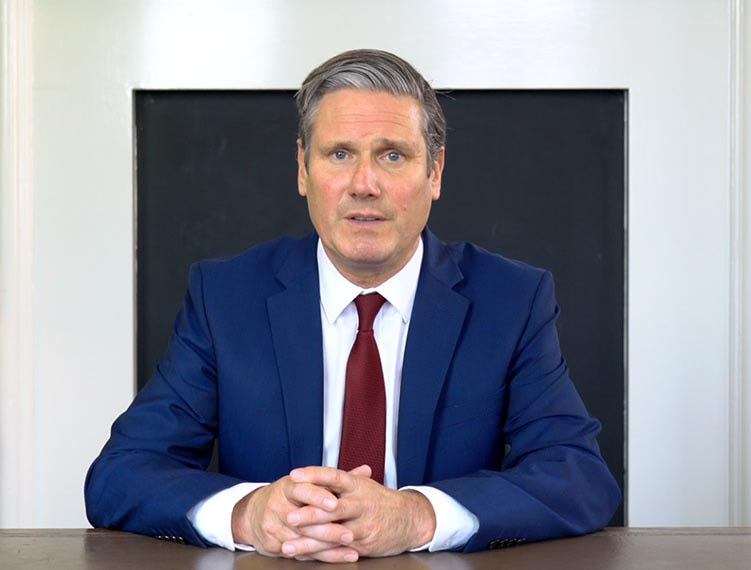Starmer pledges to launch an education “National Excellence Programme”

@Keir_Starmer will today (29th Sept) deliver his first speech as leader at Annual @UKLabour conference and pledge to deliver Labour’s ambitious school improvement plan, putting state education at the heart of his vision for Britain.
It also marks Labour’s shift to focus on improving the prospects of the 40 per cent of young people who leave compulsory education without essential qualifications, they will start by providing £250 million to local authorities to re-engage the 65,000 16-17 year olds who are not known to be in Education, Employment or Training (i.e. NEETs).
Under Labour’s ‘National Excellence Programme,’ the next Labour government will boost the number of outstanding schools in all areas of the country; drive up standards; and enable every child to achieve their full potential.
The National Excellence Programme will include:
- Recruiting thousands of new teachers to address vacancies and skills gaps across the profession;
- Reforming Ofsted to focus on supporting struggling schools;
- Providing teachers and headteachers with continuing professional development and leadership skills training.
Even before the pandemic, 200,000 primary age children in England were growing up in areas with not a single primary school rated good or outstanding.
Starmer’s speech will set out the short-term failures of the Conservative government and emphasise that the problems that are worsening because of their long-term neglect. He will warn that Britain risks being left behind if it does not open up opportunities for young people in every part of the country.
On Labour’s vision for education, Starmer will say:
“I want every parent in the country to be able to send their child to a great state school.”
“On top of that, 40 per cent of young people leave compulsory education without essential qualifications. What does that say about their future? We will not put up with that.
“That is why Labour will launch the most ambitious school improvement plan ever.”
 Paul Whiteman, general secretary of the largest union for school leaders, NAHT, said:
Paul Whiteman, general secretary of the largest union for school leaders, NAHT, said:
“It is hugely welcome to hear education take such a prominent place in Keir Starmer’s speech today. Politicians of all parties need to make education a much higher priority than it has been during the pandemic.
“School leadership is one of the toughest jobs in the public sector, so it is absolutely right that we value and invest in the on-going development and support of leaders. Our recent member surveys have painted a deeply worrying picture, with 47 per cent of leaders saying they were less likely to stay in leadership for as long as planned, following the pandemic.
“Whilst Labour’s messages this week will be well received by the profession, we need all political parties to nail their colours to the mast now and say how much extra funding they are prepared to invest in education over the immediate and longer term. What backs up the words?
“NAHT wants to see politicians from all parties talking with the highest level of ambition for education in this country. We have a generation of ambitious young people, full of hope and demanding of change. Merely talking about ‘recovery’ implies a return to what we had before, which is simply not good enough. All politicians need to be bold.
“We look forward to hearing how bold the government is going to be in proposing something ambitious and truly world-beating next week, at the Conservative Party conference. And we want this to spark debate on how such proposals will be fully funded with plans for immediate and long-term investment.”
 Tony Danker, CBI Director-General, said:
Tony Danker, CBI Director-General, said:
“The Labour party has taken an important step forward by outlining an agenda where businesses can find common ground.
“Its ambitions to decarbonise the economy and build a better future for everyone through improving education are shared by business. Lifelong learning is the bedrock of productivity, growth, and in turn, rising wages.
“Commitments on R&D spending, investment and digital skills signal an understanding of core business priorities essential for delivering a dynamic and future-focussed economy.
“Business will want to see more about their plans to unlock investment and innovation to achieve these goals.”
The National Excellence Programme would be funded by ending tax exemptions for private schools, first announced by Labour on Sunday, when Starmer set out plans to ensure that every child leaves school ready for work and ready for life.
He also announced that a Labour government would ensure every child has access to a tablet or laptop at home, by establishing a device renewal fund, out of which Local Authorities can fund renewing the 1.3million devices delivered during the pandemic as a permanent scheme for children without adequate access to a device.
There are hundreds of thousands of pupils in schools graded at requiring improvement or inadequate. Additionally, there are 210,000 pupils in ‘stuck’ schools which have received ratings of inadequate or requires improvement for 13 years or more.
There are also significant geographic inequalities, research suggests over 200,000 primary age children live in local areas where there are no good or outstanding schools and 11 out of 12 local authorities in the North East have a higher than average share of pupils attending an underperforming school.
A secondary school pupil living in the North of England is around five times as likely to attend an underperforming school than one of their peers living in London.
On Sunday Labour announced it would make sure every child leaves school job-ready and life-ready with its ‘fit for the future’ curriculum.
In 2019/20 39.8% of 19-year-olds did not have level 3 attainment (2 or more A-Levels, BTEC, T-Level or equivalent apprenticeship).
Fewer 16-18 year olds stay in education than in many other countries: 71% of 17 year olds are in education in England compared to 89% in Estonia, 93% in Sweden and 88% in the Netherlands.











Responses